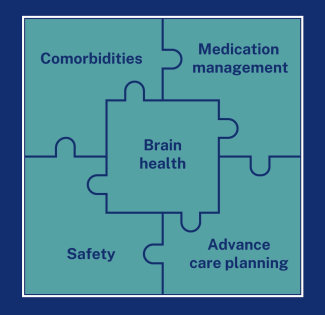Watch our video on starting a care plan

A care plan should be proactive and address the following:
Brain Health
A central piece of all care plans should include an individualized brain health plan, which slows the progression of cognitive and functional decline. This includes encouraging physical and social activity, correcting hearing and vision, preventing harmful medication side effects, and managing vascular risk factors, such as diabetes and high blood pressure.
Other important aspects of brain health include:
- preventing falls, which can cause head injury
- reducing or avoiding alcohol and substance use
- quitting smoking.
See this handout for more details about creating an individualized brain health plan for your patients.
And, the Brain Health Toolkit provides an interactive way to design a brain health plan.
Medication management
Careful medication management is a key aspect of any care plan, as mentioned in the brain health plan. It should be part of regular visits for people living with dementia.
- Regularly reevaluate any medications that are being used for dementia management for benefit and harm.
- Evaluate medications being used for other conditions for their higher risk of side effects in people living with dementia, such as sedatives or anticholinergics.
Comorbidities
First, consider how other comorbidities may be better managed in the context of dementia and how management goals might be appropriately modified. For example, someone with diabetes may need a simpler medication schedule and would benefit from an A1c goal that is less aggressive and consistent with their prognosis, as noted in the Choosing Wisely campaign.
Second, evaluate someone for comorbidities that may be directly contributing to cognitive symptoms, and review ways that you could improve their management to improve cognition. E.g. removing oxybuytnin in someone with dementia given its cognitive side effects and working on lifestyle and exercise strategies for improving incontinence.
Safety
Connecting to social services and home and community-based services is key to promoting community independence and safety. The Alzheimer's Association has many excellent general resources on these topics. In California, the Caregiver Resource Centers are hubs for locally-tailored resources in your area.
Core areas to plan for with patients and care partners:
- Driving:
- The Family Caregiver Alliance and Alzheimer's LA both have CA-specific resources on this topic to review signs of impaired driving and how to make a plan with someone who we are concerned should no longer be driving. For clinicians, we are mandated reporters in California to our local Department of Public Health, who then communicates with the DMV. One key to planning for having a conversation with someone with dementia around their driving is to plan for how the person will still have transportation and a way to be independent without driving themselves. See more here.
- Wandering:
- Wandering is a common symptom in people living with dementia. There are effective ways to manage it and to make sure that someone is as safe as possible if they do wander. See this resource by the Alzheimer's Association on how to identify wandering risk, prepare for wandering, and respond if someone wanders.
- Firearms:
- Screen for possession of firearms. If present, a safety plan should be made with the person and in many cases the firearm should be removed. See this resource.
- Home safety: This is a broad category but an important one. Most people with dementia will remain in their homes throughout their condition, so a safe environment should be a priority.
- A home safety evaluation may include a review of where locks are placed to tripping hazards. Consider using this checklist. Look for resources in your area to help with home safety evaluation and modifications, e.g. through contacting your local AAA. A Home Health evaluation with physical therapy and occupational therapy, ordered through Medicare, can identify risks and tailor modifications and equipment to the individual.
- Prepare for emergencies. This is an area of increasing urgency, especially around wildfire and weather-related emergencies. See California's guide on emergency preparedness for older adults, and Alzheimer's Association's guide for people with dementia and caregivers.
- Elder abuse: People with dementia are at very high risk of elder abuse, with estimates suggesting one in two experience mistreatment. Elder abuse includes many things: physical abuse, verbal abuse, emotional abuse, neglect and abandonment, sexual abuse, financial abuse, and undue influence. Self-neglect is also considered reportable elder abuse.
- Be familiar with the signs of abuse from the National Center on Elder Abuse. Even if people with dementia cannot communicate as well as they could before, they may be able to report abuse if asked and may have signs of abuse.
- Many of us that work with older adults with dementia are mandated reporters if they suspect abuse. We can all be familiar with reporting requirements and our local Adult Protective Services office if we need to report. Here are national resources for reporting.
Advance Care Planning
Address legal and financial planning as early as possible. Resources on medical-legal planning are vital for people with dementia and their care partners, and though it can take time, such planning reduces crises and uncertainty.
- Help patients and caregivers plan for incapacity:
- Identify and document a surrogate for health care decisions, e.g. a Durable Power of Attorney for Health Care. PREPARE is a evidence-based tool that guides people through creating and Advance Directive, including designating legal decision makers in the case of incapacity.
- Identify and document a surrogate for financial and legal decisions, e.g. a Durable Power of Attorney for Finances. Clarity Pro is a new tool designed to help professionals support patients and caregivers to do financial and legal planning, and has links to a public-facing version, as well.
- Benefits and resources for long term care and long term services and supports are valuable at all stages of dementia.
- Information about Medi-Cal and In-Home Supportive Services
- Fact sheets on planning and longterm care resources, including assisted living and skilled nursing homes, from California Advocates for Nursing Home Reform.
Symptom Monitoring
How to assess and monitor the core symptoms of dementia.
Explore Symptom MonitoringAction Plans
Creating a comprehensive plan from brain health to safety planning.

